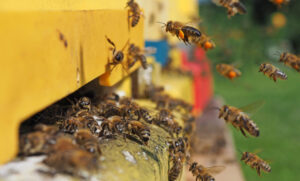Bees are crucial to our survival. Did you know they pollinate one in every three bites of food we eat?

Without bees, more than 100,000 species of plants would become extinct? But bees are in danger, as more than half of just North America’s native bee species are declining in size with a quarter of the 4,000 species at risk of extinction. In the hopes of combating this global problem, Israeli startup BeeHero – led in part by Co-founder, CTO, and Technion alumnus Yuval Regev – is using sensors to monitor beehive health and conducting bee-related research.
BeeHero’s sensors collect data from beehives that determines their overall health and predicts crop yields. Each beehive research station includes bee counters to measure real flying times and track the number of bee foraging trips, hive scales to record nectar-foraging activity, weather sensors, cameras, and the company’s patented in-hive sensors.
The company also provides beekeepers with sensors to measure sound, humidity, and temperature within the hive to analyze the information with AI and detect potential problems. BeeHero posts free online updates on overall pollination progress to assist beekeepers.
The sensors are currently used across California, and BeeHero recently opened 14 new research stations in the state. An estimated 100,000 acres of crops have already been pollinated with the company’s platform, and they hope to continue to aid with providing future global food supply by helping ensure bee welfare and health. Their technology serves growers, beekeepers, agronomists, and ag retailers alike across the U.S. and will soon expand into Australia, Europe, South Africa, and South America.

